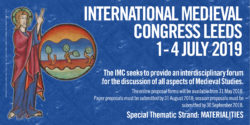IMC 2019
Special Thematic Strand: ‘Materialities’, 1 - 4 July 2019
Conference Programme
- Browse by timeslot
- Browse by sessions
- Browse by keywords
- Browse by strands
- Browse by sponsors
- Browse by participants
The IMC provides an interdisciplinary forum for the discussion of all aspects of Medieval Studies. Proposals on any topic related to the Middle Ages are welcome, while every year the IMC also chooses a special thematic focus. In 2019 this is 'Materialities'.
Recent attention to objects, artefacts, matter, and material culture has reshaped scholarship in many fields. This strand seeks to address the impact of this new interest in things, theories, and methods as they relate to an expansive understanding of ‘materiality’. The study of materiality brings together a host of scholarly and theoretical concerns and puts them into dialogue to understand how conceptions of matter, and matter itself, shaped the creation of the material world, regimes of labour and supply, connectivity, entanglements, trade networks, movements of things and people, concepts of agency and network theory, and constructed notions of the sublime, of replication, and of ‘reality’, as an abstract concept and category during the Middle Ages.
This strand seeks to bring into conversation recent work on materialities by art historians, archaeologists, paleographers, historians, economists, musicologists, liturgists, philosophers, philologists, and scholars of literature, critical theory, and religious studies, among other fields. Material objects and practices served as markers of cultural difference, but could also - simultaneously - become part of a shared culture of consumption, proximity suggesting gender and class affinities. Material dynamics were embedded in the making of objects, the trade in raw materials, and the roles of men and women in the fabrication of things spanning the luxurious to the mundane. Materialities shaped cultures of consumption, created regimes of circulation, and informed networks that defined both subjects and objects. Materialities encompass interactions between peoples both near and far and offer an analytical framework that suggests the unity of the medieval world across religious, ethnic, and spatial distances and differences.
Themes to be addressed may include, but are not limited to:
- Material culture and consumption
- Materiality and the archaeological record
- Agency of people and things
- Medieval ‘thing’ theory
- Material connections: regimes of circulation
- Materialism and the Middle Ages
- Labour and production of things
- The social life of things
- Fabrication: production of specific objects
- Replication and reproduction
- Materiality of coins, money, and circulation
- Manuscripts: material and making
- Material textual and writing cultures
- Soundscape: material and musical culture
- Light and form
- Representing the material
- Body and spirit: spirituality and the material
- Space and materialities
- Materials: mundane (e.g. wood, water, dust) and luxurious (e.g. gold, silver, gems)
- Intimacies of things
- Abundance and/or scarcity
- Imagined materials
- Material landscapes: urban, suburban, rural
- Loans, debts, credit
- Materialities of power/empire
- Race and subjectivity
- Transformations: recycling, reuse, destruction
- Material religions: beliefs and practices
- Materials and memory
- Materialities and/of conflict
- Gendered materialities
- Digital/virtual/material archives
- Conservation and preservation
- Text and/as object
The Special Thematic Strand 'Materialities' will be co-ordinated by Anne E. Lester (Department of History, Johns Hopkins University).
IMC Policy on Dignity and Mutual Respect, including Social Media Policy
To ensure that everyone can make the most of the academic, networking, and social opportunities that the IMC offers, the organisers expect all delegates, exhibitors and staff to adhere to our policy on dignity and mutual respect at all conference venues and conference-related social events, as well as online and in any form of social media.

